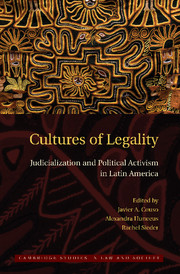Book contents
1 - Cultures of Legality: Judicialization and Political Activism in Contemporary Latin America
Published online by Cambridge University Press: 20 May 2010
Summary
INTRODUCTION
Legal practices and ideas about law are undergoing dramatic change in Latin America. Today, a turn-of-the-century crop of constitutions grants high courts greater powers; provides long lists of social, economic, and cultural rights; and assigns international treaties constitutional status – or better – within the hierarchy of laws. Judges, in turn, have embraced a new role. In the past, courts were not expected to defend – let alone expand – citizen rights, but to quietly preserve the status quo through formalist interpretation. As one scholar put it only two decades ago, “persistent cultural attitudes” have meant that Latin American judges lack “the values necessary for actively guarding the constitution against popularly elected leaders” (Rosenn 1987). But in recent years several high courts have begun to cast themselves as defenders of rights and to intervene in significant political controversies. And, correspondingly, political claims more often take legal forms. Activists throughout the region increasingly use courts as a stage for their struggles and as a portal through which to import favorable international norms. The growing importance of law, legal discourse and legal institutions in the political arena has led scholars to report that a “judicialization of politics” is underway in the region (Domingo 2004; Sieder, Schjolden, and Angell 2005).
Our volume explores this landscape of changing legal cultures. Starting with the assumption that formalism is no longer a useful concept for describing Latin American legal cultures – and was in any case always an oversimplification – we explore the repertoires of legal ideas and practices that accompany, cause, and are a consequence of the judicialization of politics.
- Type
- Chapter
- Information
- Cultures of LegalityJudicialization and Political Activism in Latin America, pp. 3 - 22Publisher: Cambridge University PressPrint publication year: 2010
References
- 10
- Cited by



